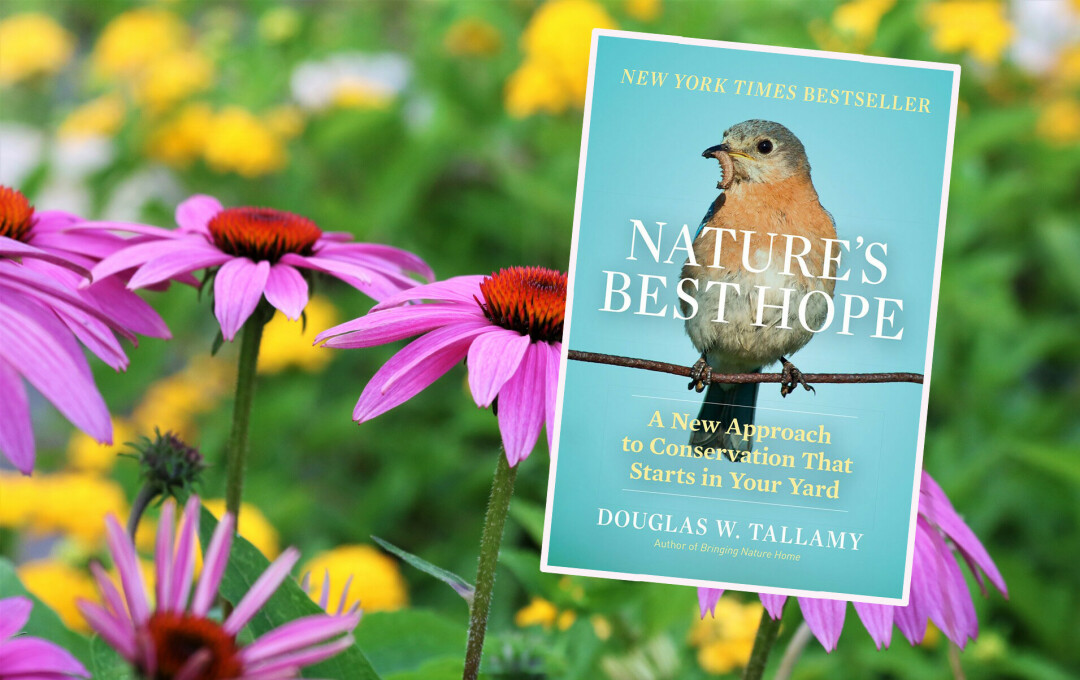One Book, One Community Program Focuses on Homegrown Conservation Efforts
‘Nature’s Best Hope’ emphasizes that rebuilding habitat can start in your own yard

Pondering environmental problems can sometimes lead to despair and inaction. Issues like climate change, declining diversity, and pollution can seem impossibly large for anyone to tackle, so why even try?
One antidote to this attitude, many environmentally concerned readers have found, is in the pages of Douglas Tallamy’s bestselling book, Nature’s Best Hope. The book’s subtitle – “A New Approach to Conservation that Starts in Your Yard” – encapsulates the solution outlined by Tallamy, a professor of entomology and wildlife ecology at the University of Delaware. It’s an idea that literally begins at the grassroots: Replacing our grass-only lawns with native plantings, which in turn creates habitats for native species and generates a ton of short- and long-term ecological benefits. Tallamy calls these “Homegrown National Parks.”
”
i like his (message) that this is not a 'red' or a 'blue' issue. this is a human issue.
He has a call to action: We're all responsible for doing what we can, whether it's two pots for pollinators on our patio for people who live in an apartment, or it could be a wildlife pond or planting native trees.
JANE MOHLER
CHIPPEWA VALLEY POLLINATOR PARTNERSHIP MEMBER
The L.E. Phillips Memorial Public Library has chosen Nature’s Best Hope as the focus of this year’s One Book, One Community Program. Like coneflowers in a Wisconsin summer, events centered on the book are blooming, including an appearance by the author at the library on Oct. 14.
“The thing I really like about Tallamy is he’s able to weave a story,” says Jane Mohler, a member of the Chippewa Valley Pollinator Partnership. “He’s able to engage people. … I like his (message) that this is not a ‘red’ or a ‘blue’ issue. This is a human issue. He has a call to action: We’re all responsible for doing what we can, whether it’s two pots for pollinators on our patio for people who live in an apartment, or it could be a wildlife pond or planting native trees.”
Earlier this year, the Pollinator Partnership – a collaboration among a number of local environmental and community groups, including JONAH, Beaver Creek Reserve, the Chippewa Valley Sierra Club, Eau Claire Master Gardeners, the Eau Claire Garden Club, and others – received a grant through JONAH from the Pablo Foundation to promote the “No Mow May” initiative in Eau Claire. The partnership was able to stretch those funds toward other activities, including encouraging the selection of Nature’s Best Hope for the city’s latest One Book, One Community project. Visit Eau Claire also chipped in with a grant to bring Tallamy to town as part of the Chippewa Valley Book Festival.
In addition to Tallamy’s presentation, the library will host several related events: “Building for the Birds,” a talk and workshop on building bluebird houses, led by Luke Trittelwitz from Beaver Creek on Sept. 23; “A Connecticut Warbler in King Climate’s Court,” a presentation by author and ornithologist Steve Betchkal moderated by writer B.J. Hollars on Sept. 26; “Make and Take Native Seed Bombs,” a workshop led by Beaver Creek’s John Metz on Sept. 30; and a community book discussion led by Mohler on Nov. 16.
In addition, numerous other groups – including book clubs and religious organizations – are planning to read and discuss the book as well, Mohler added.
Through all this book-based activity, organizers hope that Eau Claire residents learn that environmental solutions are right outside their front doors.
Learn more about the events surrounding Nature’s Best Hope at ecpubliclibrary.info/onebook. Get started on making your own space more eco-friendly on Tallamy’s website, homegrownnationalpark.org. If you have a book club interested in receiving materials related to the book, text Jane Mohler at (520) 250-4108.



















